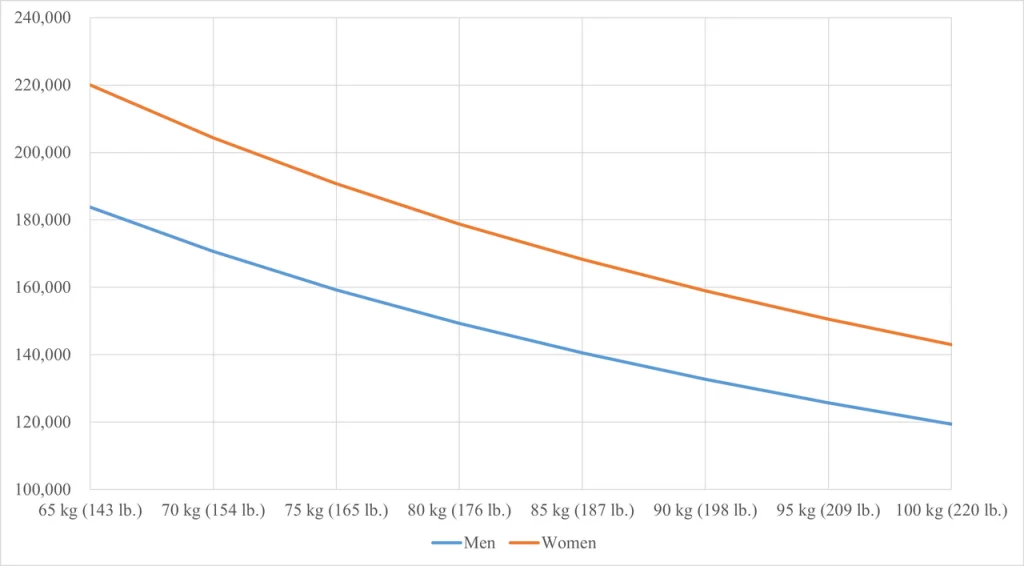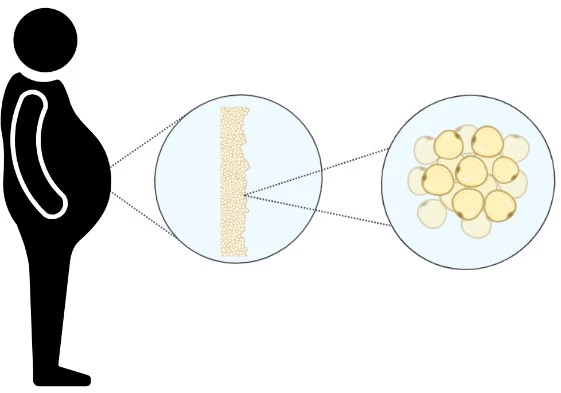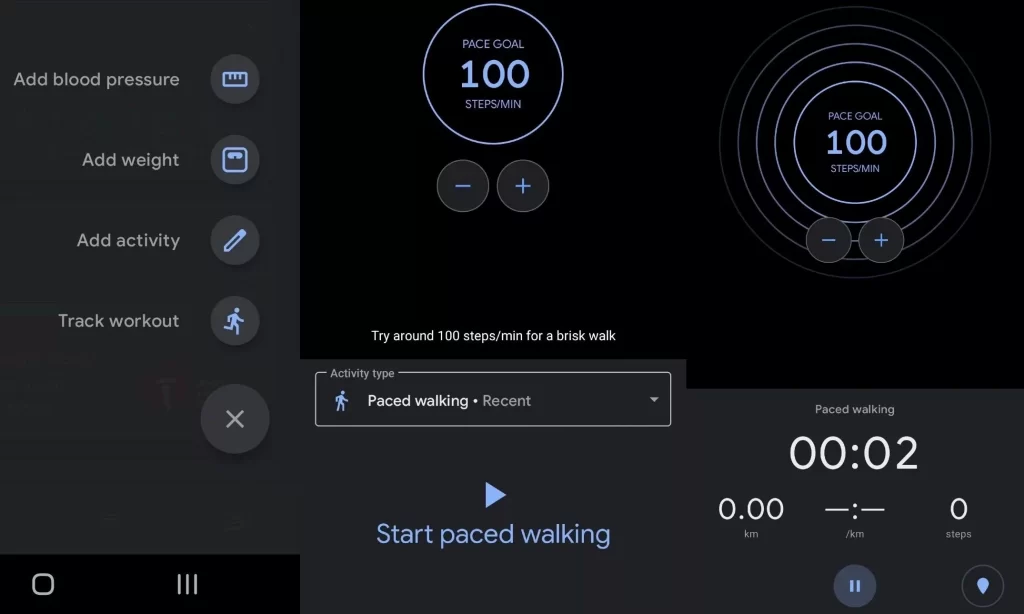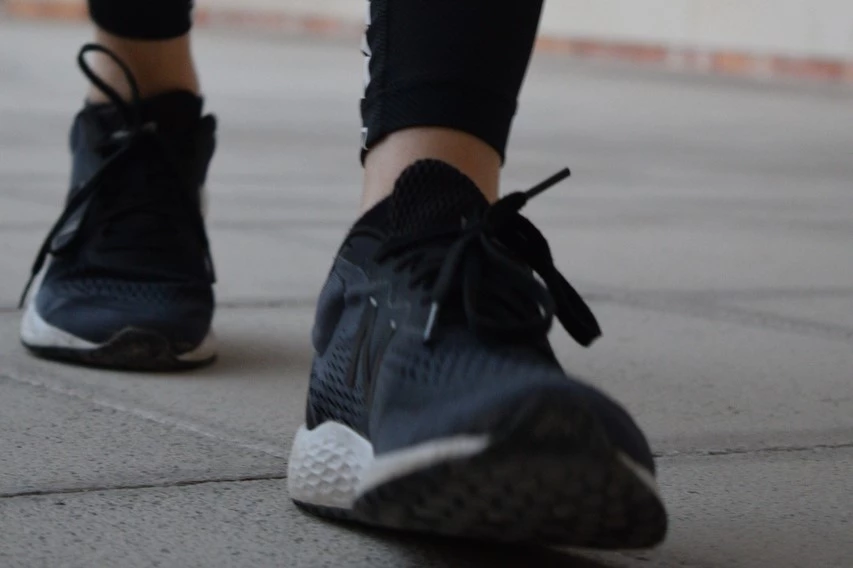On average, it takes about 160,000-240,000 steps to lose 1 kilogram (kg) walking at a brisk pace. Your weight, pace, height, and gender are all factors that affect the exact number. I’ve discussed all of these factors below to make it easier for you to estimate how many steps it would take.
Initially, 160,000-240,000 steps might sound like a lot, but keep in mind you can walk 10,000 steps a day. That translates to 16-24 days of walking at a brisk pace. A kilogram of fat requires a deficit of 7700 calories (kcal) (Source). Assuming you eat your daily calorie budget for weight maintenance, you’ll need to walk a total distance of 73-102 miles (117-164 km) at a moderate pace of 2.5 mph (4 km/h). You can also achieve the same result by walking 56-78 miles (90-127 km) at a very brisk pace of 4.5 mph (7.2 km/h).
The table below shows how many steps you’ll need to walk based on your weight, pace, and gender. An average height of 5’7″ (1.7 m) for men and 5’3″ (1.6 m) for women is used. For other heights, check out how many steps are in a kilometer.
Men: (Scroll down for women)
| Weight | Walking speed | Steps |
|---|---|---|
| 65 kg (143 lb.) | 2.5 mph (4 km/h) | 191,401 |
| 4 mph (6.4 km/h) | 183,745 | |
| 4.5 mph (7.2 km/h) | 147,653 | |
| 70 kg (154 lb.) | 2.5 mph (4 km/h) | 177,730 |
| 4 mph (6.4 km/h) | 170,621 | |
| 4.5 mph (7.2 km/h) | 137,106 | |
| 75 kg (165 lb.) | 2.5 mph (4 km/h) | 165,881 |
| 4 mph (6.4 km/h) | 159,246 | |
| 4.5 mph (7.2 km/h) | 127,966 | |
| 80 kg (176 lb.) | 2.5 mph (4 km/h) | 155,514 |
| 4 mph (6.4 km/h) | 149,293 | |
| 4.5 mph (7.2 km/h) | 119,968 | |
| 85 kg (187 lb.) | 2.5 mph (4 km/h) | 146,366 |
| 4 mph (6.4 km/h) | 140,511 | |
| 4.5 mph (7.2 km/h) | 112,911 | |
| 90 kg (198 lb.) | 2.5 mph (4 km/h) | 138,234 |
| 4 mph (6.4 km/h) | 132,705 | |
| 4.5 mph (7.2 km/h) | 106,638 | |
| 95 kg (209 lb.) | 2.5 mph (4 km/h) | 130,959 |
| 4 mph (6.4 km/h) | 125,721 | |
| 4.5 mph (7.2 km/h) | 101,025 | |
| 100 kg (220 lb.) | 2.5 mph (4 km/h) | 124,411 |
| 4 mph (6.4 km/h) | 119,434 | |
| 4.5 mph (7.2 km/h) | 95,974 | |
| 105 kg (232 lb.) | 2.5 mph (4 km/h) | 118,503 |
| 4 mph (6.4 km/h) | 113,729 | |
| 4.5 mph (7.2 km/h) | 91,399 | |
| 110 kg (243 lb.) | 2.5 mph (4 km/h) | 113,113 |
| 4 mph (6.4 km/h) | 108,570 | |
| 4.5 mph (7.2 km/h) | 87,241 | |
| 115 kg (254 lb.) | 2.5 mph (4 km/h) | 108,185 |
| 4 mph (6.4 km/h) | 103,873 | |
| 4.5 mph (7.2 km/h) | 83,468 |
Women: (Scroll up for men)
| Weight | Walking speed | Steps |
| 50 kg (110 lb.) | 2.5 mph (4 km/h) | 297,996 |
| 4 mph (6.4 km/h) | 286,076 | |
| 4.5 mph (7.2 km/h) | 229,883 | |
| 55 kg (121 lb.) | 2.5 mph (4 km/h) | 270,906 |
| 4 mph (6.4 km/h) | 260,069 | |
| 4.5 mph (7.2 km/h) | 208,984 | |
| 60 kg (132 lb.) | 2.5 mph (4 km/h) | 248,330 |
| 4 mph (6.4 km/h) | 238,397 | |
| 4.5 mph (7.2 km/h) | 191,569 | |
| 65 kg (143 lb.) | 2.5 mph (4 km/h) | 229,228 |
| 4 mph (6.4 km/h) | 220,059 | |
| 4.5 mph (7.2 km/h) | 176,833 | |
| 70 kg (154 lb.) | 2.5 mph (4 km/h) | 212,854 |
| 4 mph (6.4 km/h) | 204,340 | |
| 4.5 mph (7.2 km/h) | 164,202 | |
| 75 kg (165 lb.) | 2.5 mph (4 km/h) | 198,664 |
| 4 mph (6.4 km/h) | 190,718 | |
| 4.5 mph (7.2 km/h) | 153,255 | |
| 80 kg (176 lb.) | 2.5 mph (4 km/h) | 186,248 |
| 4 mph (6.4 km/h) | 178,798 | |
| 4.5 mph (7.2 km/h) | 143,677 | |
| 85 kg (187 lb.) | 2.5 mph (4 km/h) | 175,292 |
| 4 mph (6.4 km/h) | 168,280 | |
| 4.5 mph (7.2 km/h) | 135,225 | |
| 90 kg (198 lb.) | 2.5 mph (4 km/h) | 165,553 |
| 4 mph (6.4 km/h) | 158,931 | |
| 4.5 mph (7.2 km/h) | 127,713 | |
| 95 kg (209 lb.) | 2.5 mph (4 km/h) | 156,840 |
| 4 mph (6.4 km/h) | 150,566 | |
| 4.5 mph (7.2 km/h) | 120,991 | |
| 100 kg (220 lb.) | 2.5 mph (4 km/h) | 148,998 |
| 4 mph (6.4 km/h) | 143,038 | |
| 4.5 mph (7.2 km/h) | 114,941 |
Try using a simple pedometer to count the number of steps you take. It can make it easier to set daily goals and try to achieve them.
Why does bodyweight affect the calories burned?
Bodyweight is directly proportional to the energy you expend doing any activity. Both body size and composition determine a person’s resting energy expenditure. A heavier person will, on average, burn more calories doing the same activity as a lighter person (Source). Ironically, this means that the number of steps you’ll have to take to lose 1 kg will increase as you achieve your weight loss goals. Don’t let this demotivate you though. It always becomes easier to walk/run the more you do it!
I did some calculations to give you an idea of how your body weight affects the number of steps required to lose 1 kg. Take a look at the table I put together for men and women walking at a brisk pace of 4 mph (6.4 km/h):
| Weight | Men | Women |
|---|---|---|
| 65 kg (143 lb.) | 183,745 | 220,059 |
| 70 kg (154 lb.) | 170,621 | 204,340 |
| 75 kg (165 lb.) | 159,246 | 190,718 |
| 80 kg (176 lb.) | 149,293 | 178,798 |
| 85 kg (187 lb.) | 140,511 | 168,280 |
| 90 kg (198 lb.) | 132,705 | 158,931 |
| 95 kg (209 lb.) | 125,721 | 150,566 |
| 100 kg (220 lb.) | 119,434 | 143,038 |
This can be better visualized in the following graph showing the steps needed as a function of weight for both men and women:

How fast to walk to burn calories
Your walking pace determines the calories you’ll burn in a set amount of time. The faster you walk, the more you’ll burn walking the same distance.
If your goal is to lose 1 kg of fat, you’ll have to burn the equivalent amount of calories (7700 kcal). I calculated the steps it takes to burn the required calories based on different walking paces, and I compiled the results in a simple table. Average weights of 75 kg (165 lb.) for men and 60 kg (132 lb.) for women are used, but the trends are similar across the board.
| Pace | Men | Women |
|---|---|---|
| 2.5 mph (4.0 km/h) | 165,858 | 248,325 |
| 4.0 mph (6.4 km/h) | 159,236 | 238,392 |
| 4.5 mph (7.2 km/h) | 127,974 | 191,576 |
| 5.0 mph (8.0 km/h) | 119,889 | 179,487 |
As you can see from the table, the effect of pace on the number of steps needed is straightforward. A faster pace results in fewer steps.
How long will it take to lose 1 kilogram?
You’ll need to burn 7700 extra calories to lose a kilogram of fat. The time it will take depends on your pace and the distance you walk every day. For example, if a male of average weight walks a distance of 5 km (3.1 miles) at a slow pace of 2.5 mph (4.0 km/h) every day, it will take him 25 days. If he increases that to a distance of 7 km (4.3 miles) daily at a brisk pace of 4 mph (6.4 km/h), it will only take 17 days. This is, of course, assuming he doesn’t eat in excess of his daily calorie budget.
Take a look at the table below for the number of days it might take based on your pace and the distance. A weight of 60 kg (132 lb.) is used for women and a weight of 70 kg (154 lb.) is assumed for men.
Men: (Scroll down for women)
| Pace | Total distance | Daily distance | Days |
| 2.5 mph (4 km/h) | 125 km (78 miles) | 2 km (1.2 miles) | 63 |
| 3 km (1.9 miles) | 42 | ||
| 4 km (2.5 miles) | 31 | ||
| 5 km (3.1 miles) | 25 | ||
| 6 km (3.7 miles) | 21 | ||
| 4 mph (6.4 km/h) | 120 km (75 miles) | 2 km (1.2 miles) | 60 |
| 3 km (1.9 miles) | 40 | ||
| 4 km (2.5 miles) | 30 | ||
| 5 km (3.1 miles) | 24 | ||
| 6 km (3.7 miles) | 20 | ||
| 4.5 mph (7.2 km/h) | 96 km (60 miles) | 2 km (1.2 miles) | 48 |
| 3 km (1.9 miles) | 32 | ||
| 4 km (2.5 miles) | 24 | ||
| 5 km (3.1 miles) | 19 | ||
| 6 km (3.7 miles) | 16 |
Women: (Scroll up for men)
| Pace | Total distance | Daily distance | Days |
| 2.5 mph (4 km/h) | 164 km (102 miles) | 2 km (1.2 miles) | 82 |
| 3 km (1.9 miles) | 55 | ||
| 4 km (2.5 miles) | 41 | ||
| 5 km (3.1 miles) | 33 | ||
| 6 km (3.7 miles) | 27 | ||
| 4 mph (6.4 km/h) | 158 km (98 miles) | 2 km (1.2 miles) | 79 |
| 3 km (1.9 miles) | 53 | ||
| 4 km (2.5 miles) | 39 | ||
| 5 km (3.1 miles) | 32 | ||
| 6 km (3.7 miles) | 26 | ||
| 4.5 mph (7.2 km/h) | 127 km (79 miles) | 2 km (1.2 miles) | 63 |
| 3 km (1.9 miles) | 42 | ||
| 4 km (2.5 miles) | 32 | ||
| 5 km (3.1 miles) | 25 | ||
| 6 km (3.7 miles) | 21 |
Why burn 7700 calories (kcal) to lose 1 kilogram (kg) of fat?
It takes 7700 kcal to lose 1 kg of fat because of the lipid content of adipose tissue. Lipids or fats are organic compounds that are insoluble in water. Lipids also encompass molecules such as fatty acids and their derivatives. Adipose tissue is, simply put, your body fat.

A gram of lipids/fat yields 9 calories (kcal), and approximately 60 to 85% of the weight of white adipose tissue is lipids (Source). Therefore, it would take about 5400-7650 calories of expended energy to burn a kilogram of body fat. 7700 kcal is used as an upper limit of the number of calories you’ll need to burn before losing a kilogram of fat.
Calories to burn = 9 kcal/g × 1000 g × 0.85 = 7650 kcal
Do I need to count steps when walking?
Most people don’t count the steps they take while walking because it’s easier to track their distance and pace with a phone or watch.
However, if you’re like me, you prefer to keep your devices at home when going for a walk. My suggestion would be to try walking a known distance first. When you come back home, check how long it took you and calculate your pace. This will give you an estimate of the energy you consumed. For a more detailed calculation, check my other article on the topic. If you don’t want to do that either, you can count your steps and estimate your calories.
Another option would be to use your phone with earphones and set an audible pace for yourself. You can set a pace on the Google Fit app whether you’re using Android or iOS. Select the plus button in the lower right corner, “Track workout” and then “Paced walking” with your desired pace goal. For iOS users, another option would be to track your steps using the built-in Health App by selecting “Browse”, “Health categories”, “Activity”, and then “Steps”.

If you don’t like using your phone at all during your walks, try using a simple pedometer.
Is walking enough to lose weight?
Most dieticians recommend a balanced diet to lose weight by reducing energy intake (Source). In fact, cutting your food intake is enough to lose weight, no matter what your goals are. If, however, you do not want to change your diet, exercising could be a better option. Keep in mind that you need to watch your calorie intake and make sure you do not exceed your BMR (basal metabolic rate). After all, walking is not enough to make you lose weight if you’re eating more after you exercise.
The following table has some BMRs based on your weight and gender. They should give you a rough idea of how much you’re allowed to eat. An age of 25 and a height of 170 cm (5’7″) and 160 cm (5’3″) are assumed for men and women, respectively.
| Weight | BMR, Men (kcal) | BMR, Women (kcal) |
| 50 kg (110 lb.) | 1432 | 1297 |
| 55 kg (121 lb.) | 1499 | 1344 |
| 60 kg (132 lb.) | 1566 | 1390 |
| 65 kg (143 lb.) | 1633 | 1436 |
| 70 kg (154 lb.) | 1700 | 1482 |
| 75 kg (165 lb.) | 1767 | 1529 |
| 80 kg (176 lb.) | 1834 | 1575 |
| 85 kg (187 lb.) | 1901 | 1621 |
| 90 kg (198 lb.) | 1968 | 1667 |
| 95 kg (209 lb.) | 2035 | 1713 |
| 100 kg (220 lb.) | 2102 | 1760 |
| 105 kg (232 lb.) | 2169 | 1806 |
| 110 kg (243 lb.) | 2236 | 1852 |
| 115 kg (254 lb.) | 2303 | 1898 |
For better estimates, use the following formulas.
Men: BMR = 88.362 + (13.397 x weight in kg) + (4.799 x height in cm) – (5.677 x age)
Women: BMR = 447.593 + (9.247 x weight in kg) + (3.098 x height in cm) – (4.330 x age)
Is walking/running a sustainable activity?
Walking is one of the most sustainable activities you can do. By sustainable, I am referring to both the environment and the activity itself. Walking is better than driving for the environment, and easier to sustain than running or cycling. This is mainly because you have a lower chance of getting injured and you do not need any other equipment to walk, meaning you can start walking at any time and anywhere.

